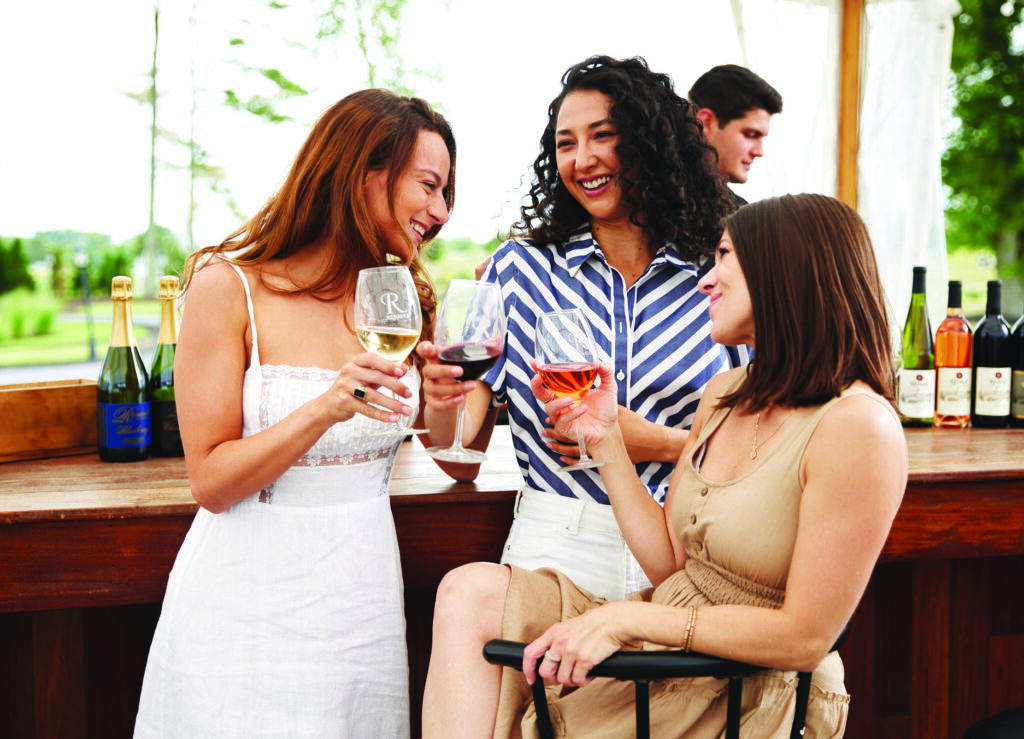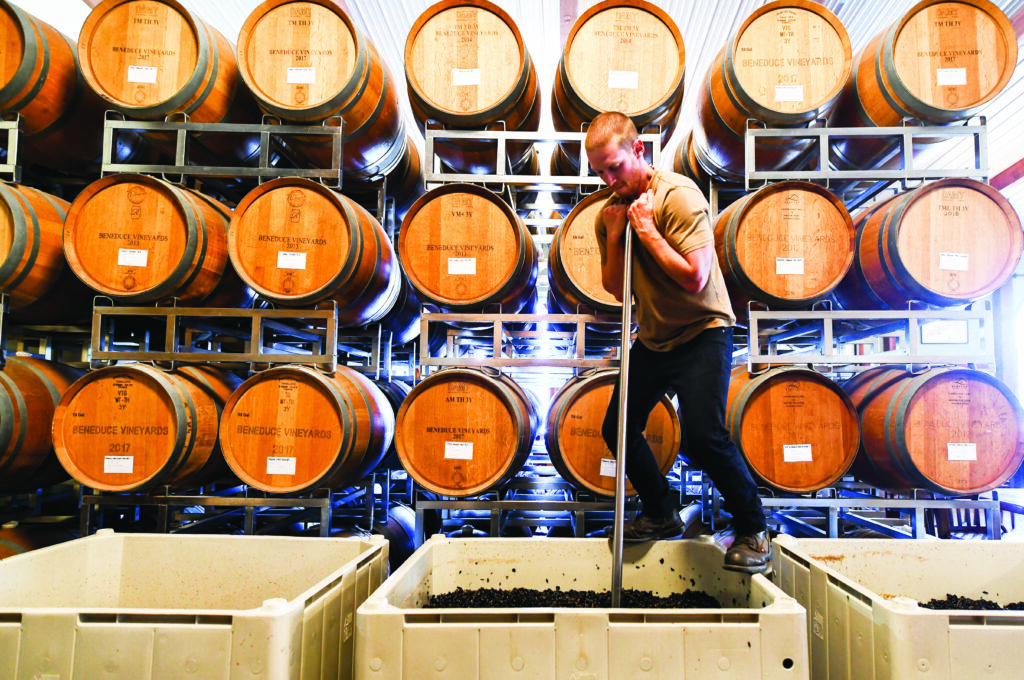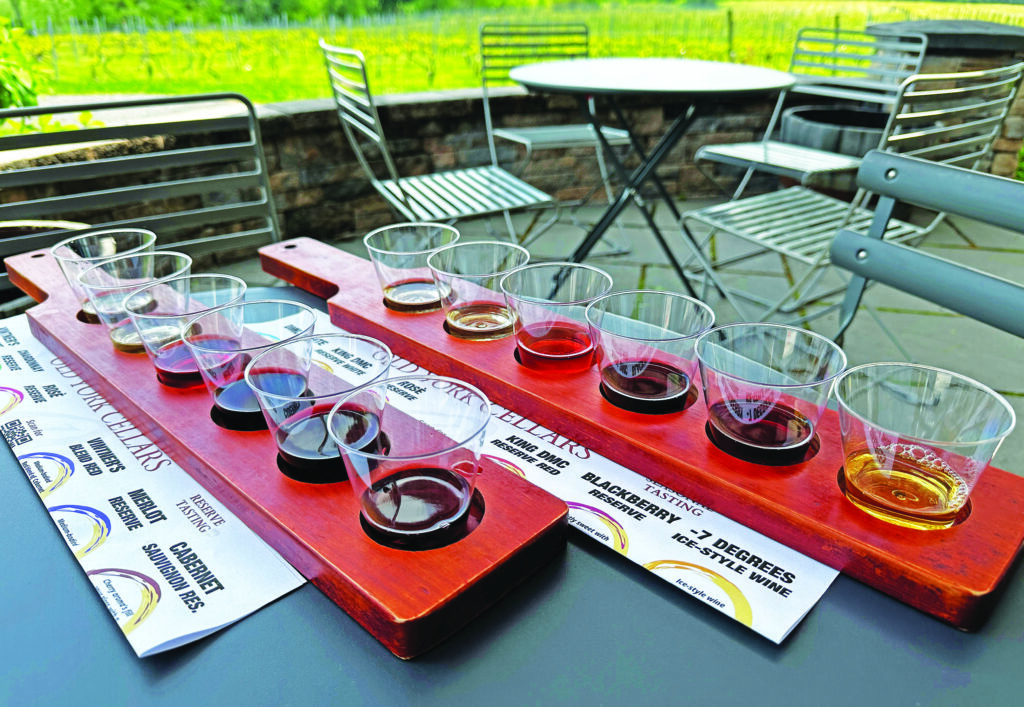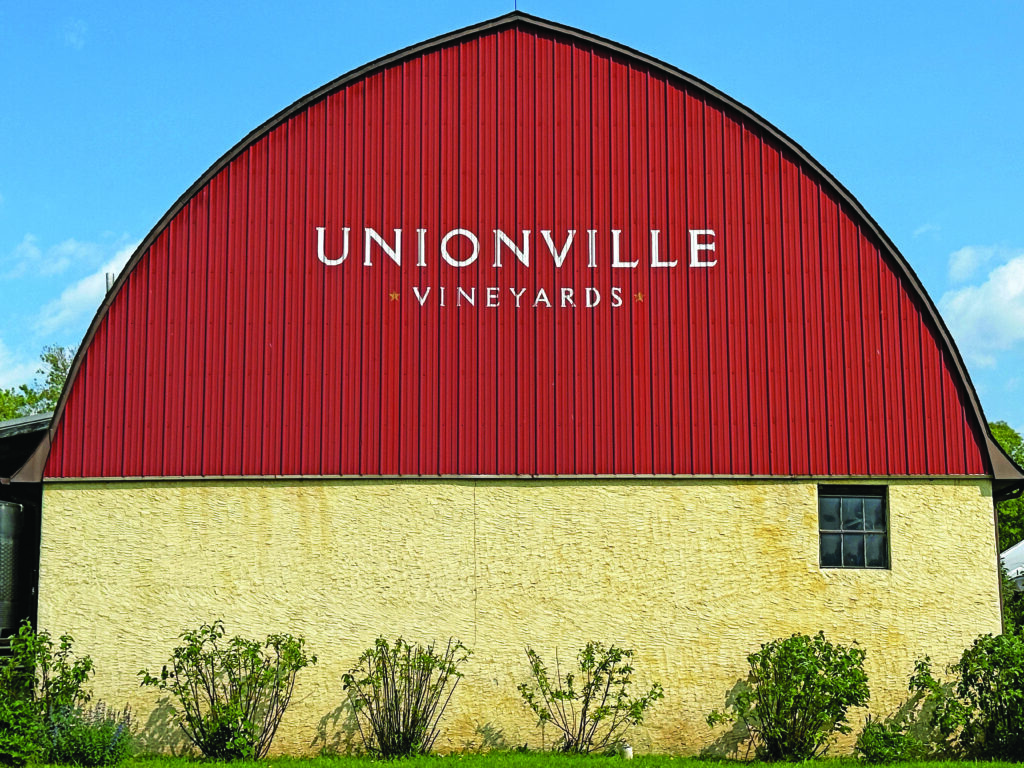Discover the booming New Jersey winemaking scene. From Cape May to Warren County, explore over 60 wineries and vineyards with agritourism appeal.
The Garden State has long ruled the agrarian roost with its world- renowned blueberries, sweet corn, and tomatoes headlining the state’s high profile $1.5 billion agricultural industry.
Long overlooked, wine grapes are now firmly rooted in the conversation as New Jersey’s viticultural and winemaking industry is basking in a full bodied breakout moment.
Rambling from the southernmost Cape May peninsula to rural Warren County in the north, the state’s 60-plus licensed wineries and vineyards are New Jersey’s fastest growing agricultural sector, with major agritourism appeal. Many are multi- generational family farms turned fully or partially over to viticulture, with owners and winemakers who welcome novices and connoisseurs alike for tours, tastings, seasonal events, weddings, and more.
With an intrepid international origin story, New Jersey’s first winery is a great starting point for uncorking your Garden State wine adventure. In the mid-1800’s, the parasitic phylloxera insect threatened to destroy Europe’s wine industry. To escape the blight, master vintner Louis Nicholas Renault left his hometown of Mareuil-sur- Ay in France’s Champagne region, vines in hand, for California.

Renault Winery & Resort (Photo courtesy of Renault Winery & Resort)
Unsuccessful there, he traveled east to New Jersey’s Egg Harbor City, about 20 miles north of Atlantic City, where his viti- cultural “voila” awaited in the sandy, loamy soil and temperate climate comparable to his home region. Originated in 1864, Renault Winery & Resort (72 North Bremen Avenue, Egg Harbor City. Tel. 609-965-2111. renaultwinery.com) is the second-oldest operating winery in the U.S. behind New York’s Brotherhood Winery (1838).
Today, the original vineyards mingle with an 18-hole championship golf course, the pretty 55-room Château Renault hotel, The Glass Museum with its collection of historic wine and Champagne glasses, and other year- round attractions, including dining, heritage-driven tasting tours, and all- inclusive “Vows in the Vines” wedding packages.
Since Renault’s vines came from the Champagne region and he followed traditional production methods, he was permitted to call his sparkling wines “Champagne,” a grandfathered privilege in effect to this day. Signature products include America’s only blueberry champagne. With a subtle kiss of the native fruit, it is an elixirous taste of New Jersey.
Like many people, I did not know that New Jersey even had a wine industry before I discovered picturesque Beneduce Vineyards (1 Jeremiah Lane, Pittstown. Tel. 908-996-3823. beneducevineyards.com) on a rambling weekend drive around farm- rich Hunterdon County, an hour west of Brooklyn. My conversation with owner Beneduce Grapes winemaker Mike Beneduce was eye-opening, starting with asking where New Jersey wines have been hiding all this time.

Mike Beneduce at Harvest Time (Photo Courtesy of Beneduce Vineyards)
“The story goes back to a Prohibition- era law that limited winery licenses in the state to one per one-million residents,” explained Beneduce. “Following passage of the New Jersey Farm Winery Act in 1981, Garden State producers have steadily progressed in both the quantity and quality of their wines.”
Farming is in Beneduce’s blood. His great-grandparents emigrated from outside Naples in the early 1900’s to Madison, NJ, where they grew roses for NYC farm markets. Over time, the business became the Great Swamp Greenhouses garden center.
In 2000, Beneduce’s father, Mike Sr., purchased a 50-acre farm as a production facility for the operation. Mike Jr., then majoring in plant sciences along with viticulture and wine-making at Cornell University, saw a career possibility and planted three acres of Chardonnay vines on the new land. In 2012, committed to “putting New Jersey wine on the map,” he opened his namesake vineyard and winery.
“New Jersey’s diverse topographies and soil types are suited to all different kinds of quality wine,” said Beneduce, whose many honors since include New Jersey’s “Outstanding Young Farmer of the Year” in 2022. “In Hunterdon County, we are talking beautiful rolling hillsides, which offer ideal sun-kissed high elevation vineyard sites that preserve acidity and freshness in the wines while allowing them to slowly develop flavor and aromatic compounds.”
Fourteen harvests later and his farm-estate is flourishing with award-winning Chardonnay, Riesling, Pinot Noir, Cabernet Franc, Dry Rose and other wines. Plus, cool-climate varietals such as full-bodied Blaufränkisch red, and experimental labels like Intermezzo, an orange wine made from fermented Gewürztraminer grapes.
Typical of New Jersey wineries, Beneduce Vineyards is a welcoming go- to for good times, with an expansive barrel-stocked tasting room, private event greenhouse, weekend food trucks, and regular outdoor events.
The awakening to New Jersey’s viticultural vibrancy dates to a seminal event that shocked the wine world. In 1976, British wine merchant Steven Spurrier organized The Judgement of Paris, a blind tasting competition in which French wine experts judged leading French wines against labels from then unknown Napa County in California.
Napa’s sweep of top honors forever elevated the destination and changed world perception of American wines.
In 2012, The American Association of Wine Economists created a similar blind tasting competition, The Judgment of Princeton International Wine Summit. New Jersey winemakers bested their French counterparts with three out of the top four spots in the all-Chardonnay white wine category, with “statistically insignificant” differences in the Bordeaux-driven red category.
“Before the Judgment of Princeton, we had a more modest megaphone compared to well-known wine destinations,” said Devon Perry, executive director of the Garden State Wine Growers Association (GSWGA). “Today, that awareness is getting amplified as we continue to tell our underdog story. Now, publications including Wine Enthusiast and Travel + Leisure, along with wine connoisseurs and enthusiasts, are moving past the double-take and looking seriously at Garden State wines.”
Around eight years ago, Sally Semeria, a Milan-based certified sommelier with the Italian Sommelier Association and her colleague Davide Gilioli set their sights on partnering with emerging U.S. wine producers and regions to help cultivate and grow their presence in Italy.
Their radar included New Jersey, where immigrant and later-generation Italian families are familiar wine industry faces. Ensuing conversations with the GSWGA led to the “New Jersey Wines to Italy Project” in June 2023.
Named “European Ambassadors of New Jersey Wine Country” at a ceremonial launch dinner that month, Semeria and Gilioli toured a dozen Garden State wineries and vineyards. Days later, Semeria presented New Jersey wines to an estimated 3,500 people at the U.S. Ambassador’s residence in Rome.
Attendees included Scott and Julianne Donnini, the married owners of Auburn Road Vineyard & Winery (117 Sharptown-Auburn Road, Pilesgrove. Tel. 856-769-9463. auburnroadvineyards.com)
in southerly Salem County. Scott, formerly a corporate lawyer, and Julianne, a former litigator, ditched the Philadelphia legal profession in 2003 to realize their winemaking dream. Self-taught winemaker Julianne produces artful bottles such as Gaia, a floral, fruity Bordeaux party of Cabernet Franc, Merlot, Cabernet Sauvignon, and Petit Verdot. The laid-back winery’s Enoteca Wine Bar, patio and courtyard were inspired by Scott’s four childhood years in Italy.
New Jersey’s 60-plus other pro- ducers, comprising some 50 licensed wineries along with commercial vineyards, have already arrived on home soil, uncorking $4.5 billion in total economic activity and attracting 272,500-plus visitors generating $92.48 million in annual tourism spending.
Spanning southern New Jersey, the 2.25 million-acre Outer Coastal Plain AVA (outercoastalplain.com), incorporating the sub-appellation Cape May Peninsula, is the largest of the state’s four American Viticultural Areas, or AVAs. Straddling Eastern Pennsylvania, the Central Delaware Valley AVA is the smallest. The Warren Hills AVA covers most of rural northwestern Warren County, which is bordered by Hunterdon County to the south.
When planning your visit, make sure to checkout the Garden State Wine Growers Association website (newjerseywines.com) and mobile app, which are a great one-stop resources for winery listings, mobile passport program, wine trails, and more. Also, we have put together a short list of wonderful wineries from which to choose:
Cape May Winery (711 Town Bank Road, Cape May. Tel. 609-884-1169. capemaywinery.com) is the state’s southernmost winery. With four vineyards, owner Toby Craig and his family, whose other local businesses include the fine-dining Washington Inn, grow varietals including Merlot, Vidal Blanc, and Chambourcin. Produce from their fields supports the menu at the winery’s tapas kitchen.
Nearby is Hawk Haven Vineyard & Winery (600 South Railroad Avenue, Rio Grande. Tel. 609-846-7347. hawkhavenvineyard.com), the third- generation iteration of German émigré Johan Wuerker’s original dairy and vegetable farm from the 1940’s. With 16 acres devoted to hardy vinifera grapes, descendant Todd Wuerker and wife Kenna’s award-winning portfolio includes Sauvignon Blanc, Riesling, and Pinot Grigio wines. Popular events include the summertime Rootstock concert series, featuring wine, live music, and food trucks.
Originated as a produce farm in 1914 by Italian immigrants Angelo and Maria Quarella, Bellview Winery (150 Atlantic Street. Landisville. Tel. 856-697-7172. bellviewwinery.com) evolved over four generations before Jim Quarella relaunched the farm as a winery in 2001, now producing 21 wine grape varieties on 40 acres. In 2022, Quarella joined forces with Lawrence Coia, founder of nearby Coia Vineyards. Earlier, in 2016 Coia and Bellview were among the first U.S. growers to plant San Marco grapes, a disease-resistant Italian import renowned for their rich flavor.
Alpaca, horses, and agrarian heritage distinguish Saddlehill Winery and Vineyards (1407 White Horse Road, Voorhees. Tel. 856-229-0007. saddlehill.com). On 70 acres of forever protected farmland bestowed by George Washington to his personal guard in 1772, proprietor Bill Green now produces 17 red, white, and rose labels onsite, with sparkling wines in the works. From cherry and plum notes in the Syrah to blueberries and red and black berries in the Merlot, fruits have a say in the oak barrel aged wines. Saddlehill also features culinary stylings from Executive Chef Daniel Stern, formerly with Philadelphia’s legendary Le-Bec-Fin.
At inviting Cedar Rose Vineyards (431 Kenyon Avenue, Millville. Tel. 856-221-3131. cedarrosevineyards.com) in Cumberland County, New Jersey-born owners Dustin Tarpine and Steven Becker produce a diverse portfolio of dry red, white, and rose wines. Inventive standouts include the 2020 Laissez-faire skin-fermented Traminette orange wine, and 2023 Cabernet Rose, a bold saignée rosé blend of Cabernet Franc and Cabernet Sauvignon.

Tasting Flight at Old York Cellars (Photo by Jeff Heilman)
Hunterdon hotspots include Old York Cellars (80 Old York Road, Ringoes. Tel. 908-284-9463. oldyorkcellars.com). In 2020, owner David Wolin, another former attorney, celebrated the vineyard’s tenth anniversary with “NJ Winery of the Year” honors and several medals at the New York International Wine Competition. Other distinctions include a wine partnership with hip hop pioneer and Run-DMC co-founder Darryl McDaniels. Score one of the prized cabanas for savoring wines and taking in the scenic vineyard views
From the crisp 2022 Unoaked Chardonnay to the honeyed ice winestyle 2022 Cool Foxy Lady made from Vidal Blanc grapes, my ten-glass flight at highly-rated Unionville Vineyards (9 Rocktown Road, Ringoes. Tel. 908-788-0400. unionvillevineyards.com) was a near ten out ten. Hand-crafted from grapes grown in six New Jersey vineyards, all Unionville wines marry well with food, with the bucolic farm setting and barn-like tasting room made to measure for lazing away the day.

Unionville Vineyards (Photo by Jeff Heilman)
Wineries in Warren County include Villa Milagro Vineyards (33 County Road 627/Finesville, Phillipsburg. Tel. 908-995-2072. villamilagrovineyards.com). Winemaker Audrey Cross- Gambino is a farmer’s daughter from Central California who formerly served as a national food and nutrition advisor, net- work TV regular, and Columbia University Medical School professor. Her husband Steve’s hats include tech whiz and race car champion. They left NYC to create their “home of miracles,” where tastings of their European-style low sulfite reds, whites, and specialty wines are elevated by the breathtaking four-county, two- state views.
Little Ridge Vineyards (607 Ridge Road, Phillipsburg. Tel. 908-319-4032. littleridgenj.com) is the dream of married couple William and Abigail Postma, who grew up on Warren County dairy farms. With a wedding in full swing in the event barn when I visited last fall, I purchased a 2020 Farmstead table red in the rustic tasting room, walked the road up through the vineyard to the tree-lined ridge and savored the flavors as the sun set on the panoramic valley below.
When I spoke with Mike Beneduce at Beneduce Vineyards earlier this year, his enthusiasm about the winemaking future of New Jersey was inspiring. ““Figuring out the best varieties for our soils and fine-tuning winemaking techniques takes time,” he said. “We now have enough collective experience under our belts to start getting those decisions right, and people are taking notice. Legally and culturally, wine is defined by where it is grown, so getting more grapes in the ground is the first step to developing a healthy and sustainable wine region for generations to come.”


